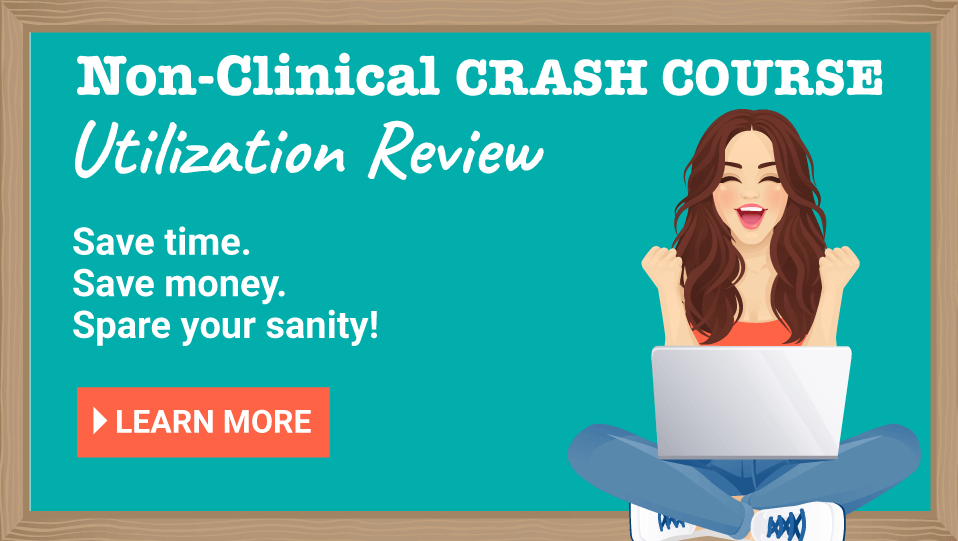Ar Home Part Time Medical Utilization Reviewer Rehabilitation
Utilization review jobs are all the rage in the non-clinical world, and for practiced reason. The utilization management field allows you to leverage your education, feel, and licensure as a rehab professional—without dealing with the physical and emotional burdens of direct patient care. If you're an OT, PT, or SLP professional person looking for a fulfilling career path that doesn't involve direct patient care, utilization review might just be the right selection for you lot!
Table of contents
- What is utilization review (UR)?
- Why is UR used in PT/OT/SLP?
- What'due south the divergence between utilization review and utilization management?
- How do physical, occupational, and speech therapy professionals piece of work in UR?
- Some of the pros of working in utilization review include:
- Some of the cons include:
- What is a typical concrete therapy utilization review salary?
- What is a twenty-four hour period in the life like as a physical therapy accountant or UR/UM professional?
- Do utilization review professionals work remotely or onsite?
- What type of growth is there in a utilization review/management role?
- What type of person would do well in a utilization review job?
- What type of specializations are needed to become a utilization reviewer?
- Can a PTA or COTA have a career in utilization review?
- How does i state a utilization review job as an OT, PT, or SLP?
- 1. Become to know the anatomy of a utilization review job posting
- ii. Do your homework on the utilization review profession
- 3. Take courses on billing and documentation
- 4. Network
- 5. Know where to notice utilization review jobs
- 6. Adapt your resume for concrete therapy utilization review jobs
- seven. Create a utilization review cover letter
- 8. Dazzle in your utilization review interview
- Is utilization review right for me?
- Companies hiring for utilization review jobs
- Special thanks
This post may comprise affiliate links or codes.
When used, The Non-Clinical PT may be compensated. For more, please read our disclosures.
What is utilization review (UR)?
Merely put, utilization review is the process of looking carefully at how healthcare benefits are being used.
UR generally refers to an insurance company (or "payer") reviewing the services delivered by a healthcare provider—and so determining whether those services fall under the coverage of the healthcare plan in question.
Only put, utilization review is an insurer'south way of making sure that a patient's insurance covers the concrete, occupational, or speech therapy services he or she is receiving (or wishes to receive in the hereafter).

Why is UR used in PT/OT/SLP?
Insurance companies utilise utilization review in order to confirm that the therapy services being delivered are actually covered by the healthcare plan, and also to ensure that patients receive the services they are owed as plan members.
The main goal of someone working in utilization management is to help manage the care the health programme member (pregnant the patient) gets through their benefits, and so that patient can return to his or her normal daily tasks.
A utilization reviewer ensures that patients receive appropriate intendance—just non excessive or inappropriate intendance that exceeds their benefit (healthcare programme).
What's the difference between utilization review and utilization management?
In general, utilization management is the umbrella term that comprises example review, appeals, denials, and tiering. All of these terms are part of managing an insurance member'due south PT benefits.
The primary goal of utilization management is to encounter that a member's benefit is not driveling, and that it is used appropriately when it is actually needed.
Technically, though, "utilization review" typically refers to the review of services that have already been delivered, while "utilization management" often refers to the review of coverage for futurity medical services.

How practice concrete, occupational, and speech therapy professionals piece of work in UR?
Many insurance providers enlist the help of utilization reviewers—often chosen physical therapy (or occupational or speech therapy) reviewers, case reviewers, chart reviewers, clinical reviewers, etc.—to perform nautical chart reviews and help determine whether coverage applies to specific cases.
In larger companies, PT, OT, and SLP professionals tin can piece of work in all sorts of departments within the UR/UM department, including:
- Appeals (including reconsideration)
- Chart Review – This might include roles similar "concrete therapy accountant"
- Denials
- Tiering
Some companies operate equally 3rd-party managers, and other payers perform their own utilization management in-house. Some hospital systems also have their own utilization management teams.
If you work for a third-party manager, health insurance companies contract with you to take care of their utilization management for various benefits.
These 3rd-political party management companies have contracts with plans from almost every region of country, including commercial, Medicare, and Medicaid plans. Nigh of these health plans outset with management of other medical specialties, and so add together PT/OT after.
Brittany Ferri, MS, OTR/Fifty, CLT is a utilization reviewer with Fidelis. She points out that utilization review is quite like to being a rehab liaison or a case manager. "There are obvious differences in the setting where the work is done," she points out. "However, you are still managing a client's case in the well-nigh intricate of means: recording therapeutic progress, keeping tabs on discharge planning, and remotely assessing all factors of a client's situation."
Here's how it generally works:
- On the provider end, a request is submitted for PT, OT, or SLP intendance that is to continue.
- A review is fabricated on the utilization management terminate, based on information provided about previous intendance to that bespeak. (Some health plans allow automobile approvals for first and second requests so patients can get some visits to beginning care and begin to show progress, while some desire reviews from the very first request.)
- Each authorization is valid for a certain time menstruum. (Typically xxx-threescore days for ortho and some neuro, and up to 120 days for developmental pediatrics.) SNF, IRF, and LTAC pre-service authorizations are usually approved for three days, and reviews can take place as oftentimes every bit every vii days inside an active plan of intendance. But physicians can deny authorizations.
- Once the visits are used, if the provider wants more than visits over a new fourth dimension period, they demand to send a new request.
Some of the pros of working in utilization review include:
- Interesting work. Getting to encounter clinical notes and courses of intendance from all over the nation tin can be very center-opening.
- Fulfillment. Being part of an endeavour to avoid fraud is a wonderful feeling.
- Flexibility (and possible work from habitation). Roles can be flexible, and are often remote/work-from-domicile. Lots of people piece of work xv-twenty hours with UR, and also work part-time in a clinic, and you'll detect quite a few parents with kids in school. Many organizations volition let you lot to piece of work flexible hours to conform kids' schedules. Depending on the company, working from home might become an option, or even be an pick from the commencement! A common remote UR role is Pre-Service Coordinator.
- Less taxing overall. Utilization review is less physically and emotionally demanding than patient care.
- Practiced pay. The pay tends to be about the same as clinical care, and then you don't need to worry about pay cut when you leave the dispensary—unless you're making banking company as a clinician. Depending on the company you work for (and how many years you've been in do/which setting you lot've been in), pay will be comparable to what you'd make every bit a PT.
- Stable piece of work with great growth potential. Utilization reviewers are being hired similar crazy as payers piece of work to prevent insurance fraud and ensure proper utilize of benefits.
- No direct patient intendance. If y'all're looking for a truly non-clinical function, UR/UM is ideal for you. There'south nix actual patient care, but yous're nevertheless very much using your caste.
- Anticipated. Utilization review professionals work set hours. If y'all're to exist working from eight:xxx to 5:00, those will exist your hours. No staying late to consummate documentation. The tasks themselves are anticipated, likewise. You'll be doing what you were hired to do, without unexpected drama!
- Relative calm. UR jobs tend to offer a at-home and anticipated schedule.
- Still using your degree/license. If you're sensitive about "wasting your degree" (which isn't the case, but still), this route could great for y'all.
- Upwardly mobility/security. Utilization review is a growing profession, and these jobs tend to be very secure, with enough of growth opportunities.
- Task-based work. Y'all check off tasks and leave work at work at the end of the night.
Some of the cons include:
- Red record. Considering many utilization review jobs are in large organizations, the work environment for these roles is often very corporate sometimes even a chip political.
- Change can come well-nigh slowly. For the same reasons, if you want an answer or change, you might have to go four or v rungs upwardly in the visitor to get answers.
- Can be depressing. Information technology can exist a scrap demoralizing to see poor treatments and practices. Because yous meet lots of charts/notes/treatment styles from across the US, you see the worst of the cookie-cutter treatments. Think 3x/week for 12 weeks for people, regardless of their diagnosis. Similarly, it can be upsetting to deny treatments to well-significant providers who are treating outside the telescopic of a patient'south benefits parcel.
- Can be frustrating. Sometimes, you lot'll get an irate provider on the other terminate of a call and you have to explain why their treatments are non covered by your employer. Information technology leaves you in the position of beingness the messenger of bad news.
- Must have a clinical license. In about cases, you must be a PT, OT, or SLP, merely exceptions are made in some companies for assistants. If you didn't laissez passer your boards or are foreign-trained and don't plan to become licensed in the US, it tin can be tough to state these jobs.
- Keeping runway of details can exist tough. Health programme regulations get complicated, and many UR organizations contract piece of work for many health plans in several states. Each wellness plan and each state have different rules and regulations, and then trying to keep it all straight can be very hard at times.
- Productivity still matters. Some companies have formal productivity rules (called "quotas"), where you have required numbers of cases to review per mean solar day. The ones that don't still typically track some sort of productivity to prevent slacking.
- Tin can be lonely. If you piece of work from home, it can feel isolating. If y'all work onsite, information technology's a different vibe than the constant chatting of the clinic.
- Repetitive. While many UR jobs have tons of different types of cases, you're still reviewing charts all twenty-four hour period, every solar day. For some people, that blazon of predictable piece of work is a blissful concept. For others, that sounds mind-numbingly dull. Some complain of a lack of a career path in these roles, only one PT Medical Direction Managing director would debate otherwise 🙂
- Lots of sitting. Yeah, that's a big change for the super agile therapists out there. That said, many workplaces have become savvy to the risks of sitting all day, and yous tin commonly find employers that are willing to spring for a stand up-upwardly desk. If you lot work from habitation, it'due south highly recommended to invest in a stand-up desk-bound.
- Occasional weekend/evening work. Some insurance plans are open on the weekends, and then you lot will sometimes need to piece of work outside of the normal K-F days. These roles are by and large salaried, and yous tin sometimes find your days stretching longer than eight hours.

What is a typical concrete therapy utilization review salary?
By and large speaking, UR/UM professionals volition earn virtually what they would make as a treating clinician. At that place might be a slight increment in pay or decrease in pay, depending on the setting in which a clinician has near recently worked.
Most utilization review roles accept required yearly reviews with pay increases, too as opportunities for bonuses.
Generally, a starting salary of $65,000-eighty,000/year is well-nigh boilerplate (with standard benefits bundle).
What is a day in the life like as a physical therapy auditor or UR/UM professional?
If y'all're looking for a modify from the physical demands of a clinical rehab chore, UR might be the right fit for you. But there are a few things to keep in mind.
Yous'll be spending lots of time at a desk!
Much of your day will be spent looking over information that a provider sends for pre-authority or retro-authorization, then deciding if their request is approved in total, in part, or denied. That decision is based very heavily on a patient's functional presentation, and whether the patient is making progress.
Depending on the size of the visitor, y'all might exist focusing on only one of these areas, or if you're working for a smaller organization, you might exist involved in many of the utilization management responsibilities. At smaller companies, you might wind up taking on extra tasks like grooming new hires, developing documentation standards,
You might start the day by logging into the reckoner system. Y'all will check email messages and wait at your agenda to come across if you lot have any scheduled peer calls with providers (therapy professionals, in most cases).
Much of the day is spent pulling up cases and reviewing the information provided to support continued PT, OT, or SLP services (depending on your discipline).
You'll be looking over the info that a provider sends to run into if meaning functional progress is being made from the skilled care delivered by that provider. Generally speaking, you'll make a conclusion to qualify to ane of the following:

- Authorize a full request
- Authorize role of a request
- Deny additional care
A utilization review PT, OT, or SLP will unremarkably get a few peer (provider) calls each week. This involves calling a provider and trying to accost their questions—and those questions usually circumduct around a reduction or denial of visits. Peer-to-peer reviews (P2P) are between ii physicians, or they tin can be between a nurse practitioner or physicians banana and a physician.
These calls can besides exist appeals review in nature. If a therapy professional person's merits is denied, they tin can entreatment for reconsideration, resulting in a (sometimes uncomfortable) telephone call.
Do utilization review professionals work remotely or onsite?
This really depends on the company. Some UR jobs are remote, and some are onsite, but go along in mind since the pandemic hit, MANY more of these roles are fully remote!

What type of growth is at that place in a utilization review/direction role?
As you get your anxiety wet, you will often get pulled into internal projects. For example, y'all might work on creating best-practice standards for review, or creating clinical guidelines for a specific type of practice (ortho, neuro, etc.).
This might involve looking up all-time peer-reviewed treatment practices per diagnosis (think JOSPT clinical practice guidelines, Cochrane database, systematic reviews, etc.), and creating guidelines that would be used to support the reviews performed in your role as a UR/UM specialist.
Y'all tin can also take on additional roles, such as:
- Internal education and mentorship of new reviewers
- Performing tier reviews
- Writing guidelines, protocols, and processes
- Creating webinars and training materials for internal use
- Training new hires
What type of person would practice well in a utilization review chore?
Anyone going into utilization review should intendance about PT, OT, and SLP benefits existence used appropriately, ethically, and at times minimally. You need to sympathize the true value of a patient using a home plan.
If you lot are 1 of those PTs that think the more visits the improve, this likely is not the task for you. Having an understanding of the divergence between physical therapy for medical need and just feeling meliorate is cardinal.
Hither are some other skills and traits that help:
- An agreement of current best practice and recommended guidelines. This is a chore where experience actually does thing, but not just letters after your proper noun. If you lot have a specialty, great. If you lot've got a wide latitude of experience, that'southward likewise bang-up…maybe even better.
- The ability to exist decisive and belittling, and not overly emotional, is helpful.
- People who can handle conflict and stay calm to resolve situations, even when a frustrated provider calls, will exercise well in these roles.
- Those who have a good understanding of the most up-to-date clinical practice guidelines will do well. For example, agreement how the use of standardized outcome measures similar LEFS, Dash, and ODI are used is key.
- Those who can professionally debate, without losing their cool, will excel in these jobs.
- Interpersonal skills, such as staying calm under force per unit area and finer negotiating, are very helpful.
- Agreement what a wellness programme is meant for is key. If yous've done any claims processes or authorizations, auditing, etc., that volition help.
What type of specializations are needed to get a utilization reviewer?
While there aren't specific certifications required to become a utilization reviewer at this time, this could easily change in the future. Per the link below, the National Association of Independent Review Organizations (NAIRO) has released a roadmap to creating a stringent clinician credentialing process. This tin be a very expert matter!
Here is the roadmap!
Condign a utilization reviewer is easier if you take a few skills under your belt, equally well as a practiced amount of feel. Some companies prefer UR professionals to have in-depth noesis in one area (pediatrics, for instance), while other organizations prefer to hire therapists with a wider breadth of experience.
Can a PTA or COTA have a career in utilization review?
It depends on the visitor. While most companies adopt to hire "full therapists" (yep, that term is annoying, I'thousand distressing), at that place are a few utilization review companies out in that location, which I accept noted below, that do hire assistants into UR roles.
How does one land a utilization review job as an OT, PT, or SLP?
1. Get to know the anatomy of a utilization review job posting
Expect at utilization reviewer task postings and get to know the language. Expect at the roles and responsibilities and consider what you lot do in your current roles (or have washed in your by roles) that matches the task description.
Aaron Hackett, PT, DPT, CCI, STMT-1 is a utilization reviewer with eviCore. He recommends taking on boosted tasks at your clinical job that volition look good on your utilization review resume. Hither are some ideas:
- Internal chart auditing
- Bring together committees for improved documentation
- Volunteer for your national or local therapy association, and volunteer in payment and policy sections
- Run a journal guild or evidence-based intendance society
Bill Daly, PT, is a denials coordinator with naviHealth. He recommends ensuring that y'all have a deep understanding of CMS guidelines before yous apply for UR roles.
two. Do your homework on the utilization review profession
Working from home or having a desk-bound job tin seem appealing when, bluntly, you could apply some help feeling happier in patient intendance.
But the real fashion to find out whether you'd enjoy being in the utilization review field is to job shadow, land advisory interviews, and accept relevant courses to discover whether you observe the work interesting.
3. Take courses on billing and documentation
My favorite CEU sources have great information courses on documentation, rehab compliance, and billing. These look great on your utilization review resume.
Hither are some groovy MedBridge ones to go yous started:
Utilise code nonclinicalPT to save 40% on unlimited CEUs!
- Documentation for Evaluations and Re-Evaluations
- Documentation: Everything After the Evaluation Through the Belch
- CPT Codes Most Commonly Used by SLPs
- CPT Codes Most Commonly Used past PTs and OTs
- NCII Edits and Billing for SLP Services
- NCII Edits and Billing for PT & OT Services
4. Network
If possible, become agile in your local APTA (or AOTA or ASHA) chapter if you're going into occupational or spoken language therapy-related utilization review jobs). Attend board meetings and take on additional assignments when possible. Y'all might wind upwards organizing meetings and planning conferences, which will expose you lot to all sorts of people in the industry.
Hackett also recommends attention billing seminars and conferences whenever possible.
Pursue leadership roles. Don't be shy about becoming more involved over time. It will be noticed.
So few people volunteer, so those on the board are very grateful!
v. Know where to notice utilization review jobs
If you are wondering how to find a job in utilization review or how to go started in utilization review, you'll definitely want to bring together The Not-Clinical PT's Gratis Facebook networking & jobs group.
You lot tin also look on UR/UM companies' own websites, indeed, Glassdoor, and LinkedIn. Word of oral fissure (networking) is ever helpful, whenever possible. If yous're however in the clinic, go talk to the billing and auth people in the back part, and ask who does the utilization management for your practise.

6. Adapt your resume for physical therapy utilization review jobs
It'due south time to tweak your non-clinical resume to highlight the right feel from your employment history.
This is i of the cases where leaving your breadth of treatment on your resume is actually beneficial (as opposed to other non-clinical roles, where you lot want to minimize the PT jargon).
Non-clinical hiring managers and recruiters won't recognize PNF or NDT, but they will understand that your monthly task of auditing other therapists' charts translates to being item-oriented.
Make certain your non-clinical resume reflects every flake of coding, auditing, and customer service-related responsibility yous have held during your career.
Review the qualifications listed in each utilization review task posting, and highlight how your experience and knowledge complement the job role. For case, you might want to play upwardly your familiarity with ICD 10 and CPT coding based on your years of feel in multiple settings, or you lot might wish to play up your communication and customer service skills.
seven. Create a utilization review cover letter of the alphabet
Create a compelling letter that demonstrates that you're the best possible candidate for the office! Make certain your cover alphabetic character addresses the company by proper name and portrays you lot equally the best solution for their problem.
8. Dazzle in your utilization review interview
The interview is your time to show how your unique personality brings life to the resume you submitted. You want prove how you'll handle conflict, your attention to item, and your familiarity with what a utilization reviewer does. Expect questions related to:
- Standard questions about strengths/weaknesses etc.
- Clinically relevant questions about how certain weather should exist managed.
- Why yous desire to leave clinical intendance and crave the change.
Brittany Ferri, MS, OTR/L, CLT, the OT utilization reviewer at Fidelis, stresses the importance of asking your own questions near the specifics of the role during the interview, especially if it'southward your first non-clinical job. "My visitor did a adept job of answering my questions and making sure I was comfortable with the change of footstep involved with becoming a utilization reviewer," she explains.
Is utilization review right for me?
This article has delved into what UR is, simply whether it'southward right for you volition depend on many factors that are unique to you. Every bit with any career modify, you'll desire to spend some time assessing your strengths, talents, and interests, and line up plenty of advisory interviews.
Companies hiring for utilization review jobs
Need a little help finding utilization review jobs? Here are a few of the companies doing so on a regular footing. Whether y'all're a physical therapist, occupational therapist, physical therapy assistant, or any other rehab professional, this volition help you lot get started with your job search. Some of these companies fifty-fifty offer remote utilization review jobs!
- Anthem
- CVS Health (Aetna)
- Centene
- Humana
- Molina Healthcare
- UnitedHealth Group (Optum)
- …and so many more!
Special cheers
I want to requite special thank you to the following contributors to this article:
- Bill Daly, PT – Denials Coordinator at NaviHealth. Here's his spotlight!
- Brittany Ferri, MS, OTR/L, CLT – Utilization Reviewer at Fidelis and freelance writer. Here's her portfolio. (Update: Brittany is now writing full time considering her UR commute was and then long. Merely she did dearest the chore!)
- Aaron Hackett, PT, DPT, CCI, STMT-1 – Physical Therapy Reviewer at EviCore Healthcare and creator of AWittyPT.com (a super comprehensive website filled with info nearly UR and humor). Here's his spotlight!
- Cindy Rapp, PT, MPT, OCS – The first UR professional person I ever knew! Her work involved collaborating with the RN Manager, PT supervisor, owner, and billing department to make certain that the PT, OT, and SLP paperwork was legal, ethical, and reimbursable.
Source: https://thenonclinicalpt.com/utilization-review/
0 Response to "Ar Home Part Time Medical Utilization Reviewer Rehabilitation"
Post a Comment